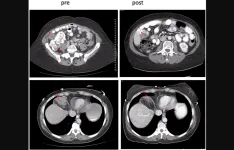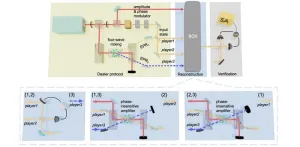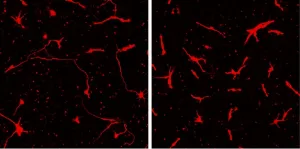(Press-News.org) Until recently, fish that eat coral — corallivores — were thought to weaken reef structures, while fish that consume algae and detritus — grazers — were thought to keep reefs healthy. But scientists have discovered that feces from grazers leave large lesions on coral, possibly because they contain coral pathogens. By contrast, feces from corallivores may provide a source of beneficial microbes that help coral thrive.
“Corallivorous fish are generally regarded as harmful because they bite the corals,” said Dr Carsten Grupstra of Rice University, lead author of the study published in Frontiers in Marine Science. “But it turns out that this doesn’t tell the whole story. Corallivore feces contain many of the bacterial taxa that associate with healthy corals under normal conditions, potentially resulting in the natural dispersal of ‘coral probiotics’, analogous to fecal microbiota transplantation therapy in humans.”
Good bacteria for healthy reefs?
Tropical coral reefs harbor lots of fish, which defecate all the time. Although fish feces disperse nutrients which may help support a healthy coral reef, they also contain pathogens and sediments which can smother parts of living coral: these dying patches of coral are called lesions. To protect delicate coral reef ecosystems, we need to understand how this cycle of waste and nutrients works.
Grupstra and colleagues studied the effects of feces from both corallivores and grazers on live coral. They placed pieces of coral in jars with sterile seawater and applied feces from corallivore and grazer fish to different jars. Some samples were sterilized, to determine whether the physical characteristics of the feces alone caused the lesions. After the experiment, each piece of coral was examined and categorized as apparently healthy, containing lesions, or dead.
Finally, the scientists sampled the feces of several corallivore and grazer species to find out what bacteria they contained. This helped them understand what kinds of bacteria might be contributing to the effects seen on the coral, whether the feces contained specific coral pathogens, and whether their results from the feces addition experiment could be generalized to other fish that also ate coral or algae and detritus.
Keeping coral healthy
Adding feces to the jars sometimes caused lesions on coral pieces, and potentially even the death of the fragment; fragments without any feces remained healthy. Feces from grazers caused lesions or death in all coral pieces, while feces from corallivores caused fewer and smaller lesions and rarely caused death. Sterilized feces from either type of fish caused little harm, comparable to the low levels of damage caused by corallivore feces. The scientists suspected that this was because of the greater abundance of coral pathogens found in the fresh feces of grazers, and the higher abundance of beneficial microbes found in the fresh feces of corallivores. The fish we assumed were harmful may thus be contributing to important processes that promote coral reef health.
“More research needs to be done to test how fish feces affect corals to see how we might use these feces in management efforts to support coral reef health,” said Grupstra.
The scientists pointed out that the lesion effects of feces may not be so severe under real-world conditions and may not be evenly distributed. The territories and behaviors of fish affect where and when they defecate; feces could disintegrate in the water, limiting lesion formation. Some feces are eaten by other fish, and organisms that live on coral may also move remaining feces that fall on corals, potentially diminishing feces effects.
“Together, these findings result in a more nuanced understanding of the roles of fish on coral reefs and may help us better understand the interactions that are happening on reefs around the world,” said Grupstra. “Both corallivores and grazers have important ecological roles and understanding these roles can help us better manage and conserve these important ecosystems.”
END
Coral-eating fish poo may act as ‘probiotics’ for reefs
Although coral-eating fish can cause damage to coral, their poo contains potentially beneficial bacteria
2023-04-13
ELSE PRESS RELEASES FROM THIS DATE:
New study demonstrates hospital safety climate and organizational characteristics predict healthcare-associated infections and occupational health outcomes
2023-04-13
Arlington, Va., April 13, 2023 – New data published today in the American Journal of Infection Control (AJIC) provide the first published evidence that a positive safety climate and adherence to standard precautions predict key healthcare-associated infection (HAI) and occupational health outcomes among patients and health care workers, respectively. The findings highlight features within hospitals’ organizations and safety climates that could be modified to improve these outcomes.
“Despite the infection prevention and safety benefits associated with standard precautions, generating consistent adherence in the healthcare setting has been ...
Selenium as a predictor of metabolic syndrome in middle age women
2023-04-12
“Recently, optimizing selenium intake in the population to prevent diseases [...] has been an important issue in modern health care worldwide.”
BUFFALO, NY- April 12, 2023 – A new research paper was published in Aging (listed by MEDLINE/PubMed as "Aging (Albany NY)" and "Aging-US" by Web of Science) Volume 15, Issue 6, entitled, “Selenium as a predictor of metabolic syndrome in middle age women.”
Metabolic syndrome (MetS) is a widespread clinical entity that has become almost a global epidemic. Selenium plays an important role in metabolic homeostasis. It has been suggested that it ...
A new vision for soybean meal: designer tempeh
2023-04-12
In a novel effort to create the next generation of plant-based, protein-rich environmentally sustainable and savory alternatives to animal meat, a University of Massachusetts Amherst food scientist has turned his attention to soybean meal.
Globally, this byproduct of soybean oil extraction is used almost exclusively for animal feed. In the U.S. alone, some 48 million metric tons of soybean meal was produced in 2022, according to the USDA.
“After the oil extraction, the majority of the protein is in the meal, not the oil,” says Hang ...
Riluzole and Sorafenib in patients with advanced solid tumors: a Phase I trial
2023-04-12
“Our phase I study determined the tolerable dose of this combination and investigated its biologic effects.”
BUFFALO, NY- April 12, 2023 – A new research paper was published in Oncotarget's Volume 14 on April 10, 2023, entitled, “A phase I trial of riluzole and sorafenib in patients with advanced solid tumors: CTEP #8850.”
Overexpression of metabotropic glutamate receptor 1 (GRM1) has been implicated in the pathogenesis of multiple cancers. Riluzole, an inhibitor of glutamate release, showed synergistic antitumor activity in combination with the multi-kinase inhibitor sorafenib ...
COVID-19 increased weekday screentime for children: study
2023-04-12
The COVID-19 pandemic led to increased weekday screentime for school-aged children says a new study involving the University of Ottawa published in JAMA Pediatrics.
Researchers examined the change in children’s screen time from prior to the pandemic to three separate pandemic waves between 2020 and 2021. Researchers found a boost of up to 1.35 hours per day during the weekdays compared to prior to the pandemic, particularly with school closures at the onset of the pandemic.
While the weekend time was on par with pre-pandemic levels, ...
In search of a better semiconductor chip
2023-04-12
A University of Texas at Arlington materials science and engineering researcher is working on a project to determine when failure happens in electronic device circuits. The research ultimately will help manufacturers design better semiconductor chips.
Choong-Un Kim, professor in the Department of Materials Science and Engineering, was awarded a $285,0000 grant from the Semiconductor Research Corporation (SRC) for the project “Enabling Electromigration Solver for Solder Joint With Various Packaging Structures and Alloys.” This is the latest in a series of grants he has received from SRC that aims to answer the demand for improved device reliability.
The SRC ...
All-optical quantum state sharing via continuous variable system
2023-04-12
Quantum information is a powerful technology for increasing the amount of information that can be processed and communicated securely. Using quantum entanglement to securely distribute a secret quantum state among multiple parties is known as “quantum state sharing.” An important protocol in quantum networks and cryptography, quantum state sharing works like this (in simple terms): a secret quantum state is divided into n shares and given to n players. The secret state can only be reconstructed ...
Father’s alcohol consumption before conception linked to brain and facial defects in offspring
2023-04-12
According to the U.S. Surgeon General, women should not drink alcoholic beverages during pregnancy because of the risk of birth defects in their unborn child. Now, research at Texas A&M University demonstrates that a father’s alcohol consumption before conception also links to growth defects that affect the development of his offspring’s brain, skull and face.
Research investigating fetal alcohol syndrome (FAS) exclusively examines maternal alcohol exposure. However, because men drink more and are more likely to binge drink than women, Dr. Michael Golding, an associate ...
New technique allows researchers to dig into molecular causes of pediatric bipolar disorder
2023-04-12
It’s extremely difficult to study the biological basis of psychiatric disorders, in part because researchers can’t easily collect brain cells from living people to study in the laboratory. Now, University of Utah Health scientists have developed a way around that.
The researchers grew three-dimensional structures, called “organoids”, derived from blood cells donated by a patient with pediatric bipolar disorder and by several family members. The approach identified significant molecular changes linked to the psychiatric condition.
The results, reported in Molecular Psychiatry, suggest that structural changes in the ...
COVID-19 pandemic will disrupt cancer reporting for years to come
2023-04-12
Key takeaways:
American College of Surgeons research published in JAMA Surgery reveals the complexities and variations that occurred in cancer reporting in the National Cancer Database (NCDB) because of the pandemic.
The number of reported cancer cases in NCDB declined by 14.4% compared with prior years, representing more than 200,000 cancer cases that were not diagnosed and/or treated at accredited facilities.
Research offers guidance to centers across the country on how to interpret data from 2020 and onwards.
CHICAGO: New research from the American College of Surgeons (ACS) outlines significant ways that the COVID-19 pandemic destabilized usual patterns of cancer care as reported ...
LAST 30 PRESS RELEASES:
Kidney cancer study finds belzutifan plus pembrolizumab post-surgery helps patients at high risk for relapse stay cancer-free longer
Alkali cation effects in electrochemical carbon dioxide reduction
Test platforms for charging wireless cars now fit on a bench
$3 million NIH grant funds national study of Medicare Advantage’s benefit expansion into social supports
Amplified Sciences achieves CAP accreditation for cutting-edge diagnostic lab
Fred Hutch announces 12 recipients of the annual Harold M. Weintraub Graduate Student Award
Native forest litter helps rebuild soil life in post-mining landscapes
Mountain soils in arid regions may emit more greenhouse gas as climate shifts, new study finds
Pairing biochar with other soil amendments could unlock stronger gains in soil health
Why do we get a skip in our step when we’re happy? Thank dopamine
UC Irvine scientists uncover cellular mechanism behind muscle repair
Platform to map living brain noninvasively takes next big step
Stress-testing the Cascadia Subduction Zone reveals variability that could impact how earthquakes spread
We may be underestimating the true carbon cost of northern wildfires
Blood test predicts which bladder cancer patients may safely skip surgery
Kennesaw State's Vijay Anand honored as National Academy of Inventors Senior Member
Recovery from whaling reveals the role of age in Humpback reproduction
Can the canny tick help prevent disease like MS and cancer?
Newcomer children show lower rates of emergency department use for non‑urgent conditions, study finds
Cognitive and neuropsychiatric function in former American football players
From trash to climate tech: rubber gloves find new life as carbon capturers materials
A step towards needed treatments for hantaviruses in new molecular map
Boys are more motivated, while girls are more compassionate?
Study identifies opposing roles for IL6 and IL6R in long-term mortality
AI accurately spots medical disorder from privacy-conscious hand images
Transient Pauli blocking for broadband ultrafast optical switching
Political polarization can spur CO2 emissions, stymie climate action
Researchers develop new strategy for improving inverted perovskite solar cells
Yes! The role of YAP and CTGF as potential therapeutic targets for preventing severe liver disease
Pancreatic cancer may begin hiding from the immune system earlier than we thought
[Press-News.org] Coral-eating fish poo may act as ‘probiotics’ for reefsAlthough coral-eating fish can cause damage to coral, their poo contains potentially beneficial bacteria




